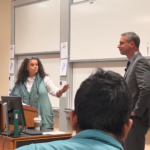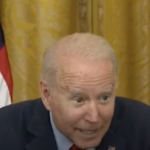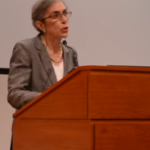Holding Out For A Hero
What do Franklin Roosevelt, Harry Truman, John Kennedy, Lyndon Johnson, Richard Nixon, Gerald Ford, Jimmy Carter, William Clinton, George W. Bush and Barack Obama all have in common? Alright, you got the easy part, but what was their preparation for the White House? All 10 of these men were either governors, U.S. Senators or Members of Congress before assuming the presidency (or the vice-presidency).
Over the last 80 years only one man came directly to the presidency from a discipline other than politics. Dwight D. Eisenhower served two terms from 1953-1961, after an unprecedented and distinguished military career culminating in the Allied victory in World War II. Two other presidents in this time frame, Ronald Reagan and George H.W. Bush, served as governor and congressman, respectively, before assuming the presidency. However, Reagan had a career as an actor and political activist before entering politics and Bush served in many prominent government positions between his congressional term and the presidency. In summary, out of the last 13 U.S. presidents, only Eisenhower came to the White House with no political background.
It is true that throughout American history the vast majority of U.S. presidents came from a political background and many of them, regardless of political persuasion, were recognized as strong effective leaders. So why start the list with FDR? The New Deal, under President Roosevelt, was the incubation of the vast network of spending programs and government intrusion into the private sector, which started the spiral of big and expensive government. We have never recovered. The cancer started in 1933 and the tumor has spread to our vital organs and requires emergency and unconventional treatment.
None of these men assumed the presidency with a fifteen trillion dollar debt, which will be the fate of whomever is elected in 2012. This debt threatens the very survival of America as a free nation. If the servicing of that debt were at six percent, the interest alone would be over $900 billion per year and will soon become a trillion, if it is not harnessed and reversed. This debt means that we depend upon China and other creditors for our survival. It means that we could quickly lose our ability to build the defenses to protect our people and control our borders, and payments such as social security and veterans’ benefits will not be met. In addition, our Constitution could be discarded in anarchy and we could have rioting in the streets that would make Egypt look like a picnic in the park. You think it cannot happen here? Think again. The fall from a world power to a debtor nation would make us as vulnerable domestically as internationally. We are at the crossroads and we need a leader to move us out of the morass.
To get a handle on our debt and to chart the right course for the future, America needs a strong leader, a person who has the guts to challenge the political establishment and come to office owing them nothing. We desperately need a person who will put country above politics. Can a governor, U.S. senator or congressman be that person? There are certainly enough of them running! The answer is “yes,” of course, a strong leader could emerge from the list of candidates. It has happened many times before in American history. If those who wish to replace Obama will outline a plan to save America from financial ruin, go head to head with the political establishment who gave us this mess and take their case to the American people, then we can once more reach into the political grab bag and pull out a leader. However, why restrict the list? There are leaders in the military, industry, philanthropy, science, finance, religion, investment and even sports and entertainment who might emerge. Why do they not come forth and participate?
It is always the politician who enters the primaries and plays the political game. Successful, non-political leaders do not have the time or patience to play the game with lobbyists, advertising firms, “spin doctors,” pollsters, consultants, party elites and the mindless number of political clones who cower in the endless cubby holes of the national and state political party offices writing negative ads, trying to dig up nasty information and telling the candidates how to dress, talk, think and act. Sarah Palin found this out the hard way in the 2008 campaign. A strong leader outside the confines of politics might have the ability to harness and direct this kind of bureaucracy, and not allow him or herself to be controlled by it. People who have excelled as leaders outside of politics seem to be shunned by the “political establishment.” But maybe there is someone out there, for the sake of their country, with the courage to take them on—someone who could open the window and let in a nice fresh breeze.
The incestuous nature of politics is not restricted to the structure and operation of the two-party system. It is alive and well inside the U.S. House, Senate and the White House. The seniority system invites staleness in thought and decision making. It is much easier to “slide into the system” than it is to challenge the “old bulls” with new ideas and new visions. It is much more common to be reactive than proactive.
Even though Congress has responsibility for oversight, it never occurs until after something happens. The financial crisis comes to mind as the most recent example. Politicians think in terms of the next election as opposed to the next generation. Statements such as “we must support our president,” “we must support our leader,” or “we must support the party” frequently resonate around the Capitol. How often have we heard, “we must support the Constitution,” or, “we must do what the people elected us to do?” We do not need a president and a Congress who govern from their inboxes. We need leaders who know what to do even when there is nothing in the inboxes. The Tea Party has begun to unsettle the status quo a bit in Congress, which is why the liberal media and the establishment of both political parties fear and attack them. Perhaps the Tea Party can help solve these problems, but it will be a long and difficult fight. They will need help from the president to get it done.
Even the White House, with its daily polling and keeping the finger on the political pulse when making decisions, has contributed to the pervasive political sickness. Wouldn’t you like to see a John Wayne-type character just ride in on that big white stallion and take charge? I want a president who takes on the deficit and the debt in this country and is not afraid to challenge the political establishment to do it. I want a leader who demands of Congress that they join him/her in Social Security and other entitlement reform, and that we lay out a firm, solid plan to balance the budget and pay down the debt now, not tomorrow. No kicking the can down the road and leaving our children to pay for our selfish stupidity.
This nation is a republic. The people elect their officials to lead, not to take polls to make decisions. I want a leader who will tell the American people the truth about the dire financial straits of our nation, and that it could very well be the end of our republic without tough choices now. If the people seem skeptical then I want that leader to rally them behind him or her to save America! I do not want a leader “of the politicians, by the politicians and for the politicians.” That leader may come from politics or the private sector, but they must be prepared to restore our Constitution, our pride, our fiscal sanity and our nation. Who are you and where are you? We need you now more than ever.
Former Senator Bob Smith (R-NH), known as “Senator Bob,” has joined Accuracy in Media as a Special Contributor. His columns and commentaries on media and politics will be available on a regular basis on the AIM website at www.aim.org. He can be contacted at senatorbobsmith@comcast.net.




